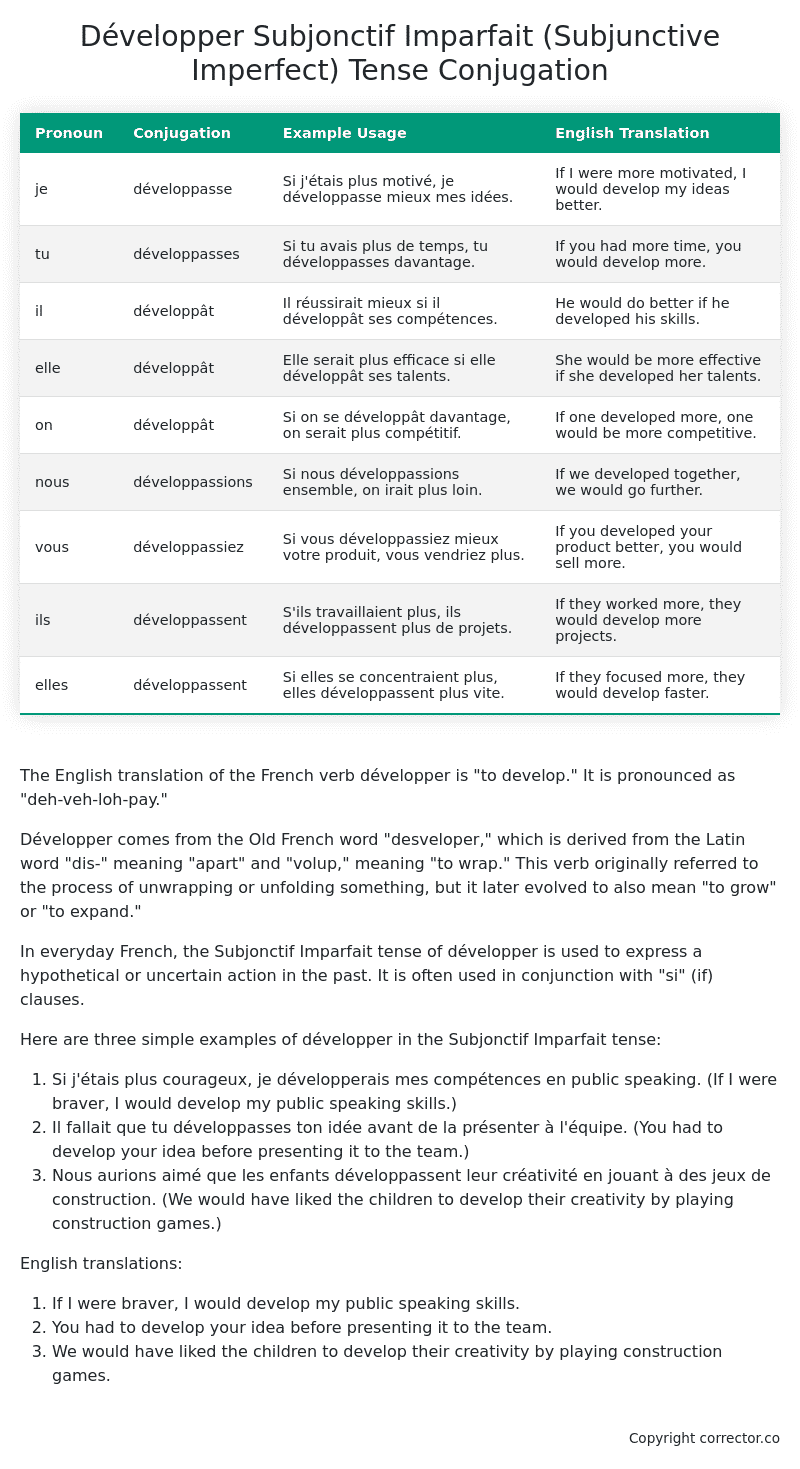Subjonctif Imparfait (Subjunctive Imperfect) Tense Conjugation of the French Verb développer
Introduction to the verb développer
The English translation of the French verb développer is “to develop.” It is pronounced as “deh-veh-loh-pay.”
Développer comes from the Old French word “desveloper,” which is derived from the Latin word “dis-” meaning “apart” and “volup,” meaning “to wrap.” This verb originally referred to the process of unwrapping or unfolding something, but it later evolved to also mean “to grow” or “to expand.”
In everyday French, the Subjonctif Imparfait tense of développer is used to express a hypothetical or uncertain action in the past. It is often used in conjunction with “si” (if) clauses.
Here are three simple examples of développer in the Subjonctif Imparfait tense:
- Si j’étais plus courageux, je développerais mes compétences en public speaking. (If I were braver, I would develop my public speaking skills.)
- Il fallait que tu développasses ton idée avant de la présenter à l’équipe. (You had to develop your idea before presenting it to the team.)
- Nous aurions aimé que les enfants développassent leur créativité en jouant à des jeux de construction. (We would have liked the children to develop their creativity by playing construction games.)
English translations:
- If I were braver, I would develop my public speaking skills.
- You had to develop your idea before presenting it to the team.
- We would have liked the children to develop their creativity by playing construction games.
Table of the Subjonctif Imparfait (Subjunctive Imperfect) Tense Conjugation of développer
| Pronoun | Conjugation | Example Usage | English Translation |
|---|---|---|---|
| je | développasse | Si j’étais plus motivé, je développasse mieux mes idées. | If I were more motivated, I would develop my ideas better. |
| tu | développasses | Si tu avais plus de temps, tu développasses davantage. | If you had more time, you would develop more. |
| il | développât | Il réussirait mieux si il développât ses compétences. | He would do better if he developed his skills. |
| elle | développât | Elle serait plus efficace si elle développât ses talents. | She would be more effective if she developed her talents. |
| on | développât | Si on se développât davantage, on serait plus compétitif. | If one developed more, one would be more competitive. |
| nous | développassions | Si nous développassions ensemble, on irait plus loin. | If we developed together, we would go further. |
| vous | développassiez | Si vous développassiez mieux votre produit, vous vendriez plus. | If you developed your product better, you would sell more. |
| ils | développassent | S’ils travaillaient plus, ils développassent plus de projets. | If they worked more, they would develop more projects. |
| elles | développassent | Si elles se concentraient plus, elles développassent plus vite. | If they focused more, they would develop faster. |
Other Conjugations for Développer.
Le Present (Present Tense) Conjugation of the French Verb développer
Imparfait (Imperfect) Tense Conjugation of the French Verb développer
Passé Simple (Simple Past) Tense Conjugation of the French Verb développer
Passé Composé (Present Perfect) Tense Conjugation of the French Verb développer
Futur Simple (Simple Future) Tense Conjugation of the French Verb développer
Futur Proche (Near Future) Tense Conjugation of the French Verb développer
Plus-que-parfait (Pluperfect) Tense Conjugation of the French Verb développer
Passé Antérieur (Past Anterior) Tense Conjugation of the French Verb développer
Futur Antérieur (Future Anterior) Tense Conjugation of the French Verb développer
Subjonctif Présent (Subjunctive Present) Tense Conjugation of the French Verb développer
Subjonctif Passé (Subjunctive Past) Tense Conjugation of the French Verb développer
Subjonctif Imparfait (Subjunctive Imperfect) Tense Conjugation of the French Verb développer (this article)
Subjonctif Plus-que-parfait (Subjunctive Pluperfect) Tense Conjugation of the French Verb développer
Conditionnel Présent (Conditional Present) Tense Conjugation of the French Verb développer
Conditionnel Passé (Conditional Past) Tense Conjugation of the French Verb développer
L’impératif Présent (Imperative Present) Tense Conjugation of the French Verb développer
L’infinitif Présent (Infinitive Present) Tense Conjugation of the French Verb développer
Struggling with French verbs or the language in general? Why not use our free French Grammar Checker – no registration required!
Get a FREE Download Study Sheet of this Conjugation 🔥
Simply right click the image below, click “save image” and get your free reference for the développer Subjonctif Imparfait tense conjugation!

Développer – About the French Subjonctif Imparfait (Subjunctive Imperfect) Tense
Formation
Common Everyday Usage Patterns
Interactions with Other Tenses
Subjonctif Présent
Indicatif Passé Composé
Conditional
Conditional Perfect
Summary
I hope you enjoyed this article on the verb développer. Still in a learning mood? Check out another TOTALLY random French verb conjugation!


